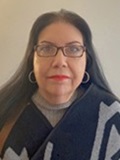Examining the Impact of Historical Policies on Health Disparities (Part 2 of 2)
March 20, 2025
12:00 PM - 1:00 PM (ET)
Webinar Details
Structural racism, embedded in unjust policies, has created and sustained poor social determinants of health thatcontribute to health disparities in the United States. These issues are deep, complex, and embedded in the history of our country. This can leave providers feeling overwhelmed as they work to address the residual effects that present as persistent chronic disease and premature death for many historically underrepresented groups. In this second of a two-part series, we will speak with experts in redlining, social determinants of health, and health disparities to understand how nurses can advocate for policy change to ameliorate health disparities and improve the health conditions for all people.
Outcomes:
- Identify at least one key area of health policy that can increase healthcare access.
- Verbalize key strategies to gain access to policy influencers.
- Verbalize at least one way to improve health outcomes and healthcare access at the local, state, and national levels.
This webinar is hosted by AACN’s Faculty Leadership Network.
Miss the first webinar in this series? View Part 1 webinar here.
Have questions prior to the webinar? Submit them here.
Note: Recording of the webinar will be available soon after the webinar airs. Visit AACN's On-Demand Webinars to watch.
Speakers
Speakers
 Felesia Bowen, PhD, DNP, PPCNP-BC, FAAN
Felesia Bowen, PhD, DNP, PPCNP-BC, FAAN
Professor and Associate Dean
University of Alabama at Birmingham School of Nursing
Dr. Felesia Bowen is Professor and Associate Dean at the University of Alabama at Birmingham School of Nursing. She is a decorated U.S. Army Nurse Corps veteran who earned her BSN at Tuskegee University, Master’s degree from Rutgers University, PhD from Columbia University, and DNP from Fairleigh Dickinson University, Teaneck, NJ. Dr. Bowen has devoted her career to improving health disparities and equity for children, their families, and the communities they live in. Dr. Bowen is known and respected for her unconventional and upstream approaches to addressing nursing workforce diversity. Dr. Bowen is a firm believer that student nurse diversity is necessary to decrease health disparities in minority and marginalized individuals. Dr. Bowen is a nationally certified primary care pediatric nurse practitioner and President-elect of the National Association of Pediatric Nurse Practitioners.
 Loretta T. Lee, PhD, RN, CRNP, FNP-BC, CNE, FADLN, FNAP
Loretta T. Lee, PhD, RN, CRNP, FNP-BC, CNE, FADLN, FNAP
Professor and Department Vice Chair, Family, Community and Health Systems
University of Alabama Birmingham School of Nursing
Dr. Loretta T. Lee, Professor and Vice Chair of the Department of Family, Community and Health Systems at the University of Alabama at Birmingham School of Nursing, is a leading figure in health policy advocacy and the healthcare industry. Her fellowships with the American Academies of Practice, the Academy of Diversity Leaders in Nursing, and her National Black Nurses Association Inc. Health Policy Committee chairmanship demonstrate her dedication to interprofessional education and advocating for health policies that will transform healthcare. Dr. L ee’s academic journey, from earning her PhD in 2012 to her BSN in 1986, has been a testament to her commitment to nursing and healthcare. As a nurse scientist, her scholarship and research center on advancing transformative health equity for historically marginalized populations. Dr. Lee is a board-certified family nurse practitioner, a National League for Nursing Commission for Nursing Education Accreditation program evaluator, and an associate editor for the international peer-reviewed journal Ethnicity and Health.

Joy Deupree, PhD, MSN, RN, WHNP-BC, FAAN
Professor Nursing Acute, Chronic & Continuing Care
University of Alabama at Birmingham School of Nursing
Dr. Joy Deupree is a board-certified women’s health nurse practitioner, educator, researcher and policy advocate. Her work has focused on reducing health disparities in rural and underserved areas of the South. In 2006, Dr. Deupree co-founded the Nurse Practitioner Alliance of Alabama (NPAA). Her advocacy for all nurses to practice to the full extent of their training and education led her to dedicate more than 10 years to NPAA leadership positions strategizing with stakeholders in Alabama to reduce barriers to practice and improve access to care. As president of the NPAA from 2012 to 2013, she championed numerous legislative and regulatory efforts that exponentially increased practice opportunities for NPs to improve access to care for rural Alabamians. Dr. Deupree was a faculty member in the UAB School of Nursing from 1999 to 2019, where she held numerous leadership positions, and in 2019, she relocated to the University of South Carolina College of Nursing, where she was a professor and Associate Dean for Practice Innovation, Partnerships. In 2023, she returned to the UAB School of Nursing and was a professor and Director of Health Policy Partnerships in the Office of Clinical and Global Partnerships from 2023 to 2024.
Lorna Finnegan, PhD, RN, FNP, FAAN
Dean and Professor
Loyola University Chicago
Lorna Finnegan joined Loyola University Chicago in 2019 as Professor and Dean of the Marcella Niehoff School of Nursing. She brings extensive experience in academic research, teaching, clinical practice, and leadership to her role. Dr. Finnegan earned her BSN, MS, and PhD from the University of Illinois Chicago (UIC) College of Nursing. Before joining Loyola, she held leadership positions at UIC, including Executive Associate Dean and Department Head. Earlier in her career, she served as the Founding Director of the Family Nurse Practitioner Program at Saint Xavier University in Chicago. She is also the past president of the National Organization of Nurse Practitioner Faculties, the leading organization dedicated to advancing quality nurse practitioner education. Her scholarship, clinical practice, and leadership focus on integrating big data analytics, strategic academic-practice partnerships, innovative teaching strategies, and policy-shaping leadership to enhance access to primary care and promote health equity among vulnerable and underserved populations. Dr. Finnegan has received National Institutes of Health funding for her research on symptom clusters in adults with multiple chronic illnesses and has been recognized with numerous awards for her contributions to teaching, research, and leadership. She has also served as a visiting scholar at universities in Thailand, South Africa, and South Korea.
Tags
Examining the Impact of Historical Policies on Health Disparities (Part 1 of 2)
February 27, 2025
12:00 PM - 1:00 PM (ET)
Presented by the Faculty Leadership Network
Webinar Details
Health disparities disproportionately impact individuals from historically underrepresented backgrounds and their communities. Institutional and structural racism undergird the conditions that perpetuate health disparities and make it easy to blame the affected for their poor health. Healthcare leaders and providers must understand the egregious, intentional, and unjust policies that have shaped the way for poor social determinants of health. The first of this two-part series serves as a primer to help providers understand the issue's complexity both across the nation and within their own communities.
Outcomes:
- Understand the etiology of redlining.
- Identify redlines within the communities they practice in.
- Explain how high prevalence health disparity issues in their community are connected to unjust policies.
- Develop strategies to incorporate the concept into their courses and curriculum.
Note: Recording of the webinar will be available soon after the webinar airs. Visit AACN's On-Demand Webinars to watch.
Speakers
Speakers
 Felesia Bowen, PhD, DNP, PPCNP-BC, FAAN
Felesia Bowen, PhD, DNP, PPCNP-BC, FAAN
Professor and Associate Dean
University of Alabama at Birmingham School of Nursing
Dr. Felesia Bowen is Professor and Associate Dean at the University of Alabama at Birmingham School of Nursing. She is a decorated U.S. Army Nurse Corps veteran who earned her BSN at Tuskegee University, Master’s degree from Rutgers University, PhD from Columbia University, and DNP from Fairleigh Dickinson University, Teaneck, NJ. Dr. Bowen has devoted her career to improving health disparities and equity for children, their families, and the communities they live in. Dr. Bowen is known and respected for her unconventional, and upstream approaches to addressing nursing workforce diversity. Dr. Bowen is a firm believer that student nurse diversity is necessary to decrease health disparities in minority and marginalized individuals. Dr. Bowen is a nationally certified primary care pediatric nurse practitioner and President-elect of the National Association of Pediatric Nurse Practitioners.
Tags
Federal Policies and Structural Inequities in American Indian Health
March 21, 2024
2:00 PM - 3:00 PM (ET)
Webinar Details
American Indians and Alaska Natives (AIAN) are the ‘unseen’ populations in the US. Americans know very little about the people Indigenous to North America, and it has been by design. The Health Professions education, research, and practice often rely on the asterisk as a placeholder in lieu of this missing information (Shotton, H., Lowe, S., & Waterman, S., 2023). This leaves the AIAN patient population with less than inadequate care and outcomes. Native faculty, staff, students, and patients can feel like they are ‘infiltrating’ institutions not designed for them or, in fact, designed in ways that constructively keep them out. The Future of Nursing reports were the seminal reports for the profession moving forward, with the first in 2010 being the most downloaded IOM (now NAM) report. The first Future of Nursing Report had two mentions of AIAN, and the current Report has less than one page focused on AIAN in a 500-page report. AIAN shares all the same issues, barriers, and systemic racism as other BIPOC groups, but as partially sovereign nations within the US, they have legal, geopolitical, and land-based issues none of the other groups have. To reach real solutions, there must be persistent, sustained, adequate, system-wide education on this very specific population for nursing and beyond.
Objectives:
- Recognize the impact of past and present federal legislation on the health and wellbeing of Indigenous communities.
- Describe the health disparities impacting American Indian and Alaska Native populations and their policy origins.
- Demonstrate best practices for allyship to Indigenous communities as a healthcare provider.
Note: Recording of the webinar will be available soon after the webinar airs. Visit AACN's On-Demand Webinars to watch.
Speakers
Speakers

Margaret P. Moss, PhD, JD, RN, FAAN
Professor and Associate Dean for Nursing and Health Policy
Katherine R. & C. Walton Lillehei Chair in Nursing Leadership
University of Minnesota School of Nursing
Dr. Margaret Moss is an enrolled member of the Mandan, Hidatsa, and Arikara Nation in North Dakota. She is the first and only American Indian to hold both Nursing and Juris Doctorates. She has been a nurse for 35 years and an academic for 24 years across 4 universities including the University of Minnesota (twice) where she has returned as Professor in Nursing and Associate Dean of Nursing and Health Policy, Yale University, SUNY Buffalo and the University of British Columbia (UBC). Just prior she was at UBC 2018-2023, as a Professor, School of Nursing, Interim Associate Vice President Equity & Inclusion for the University, and Director of the UBC First Nations House of Learning, a strategic Indigenous leadership position under the Provost. She co-led the development and launch of the UBC Indigenous Strategic Plan (2020) one of the only comprehensive plans in No. America. Dr. Moss was named to the inaugural Forbes 50 over 50 Impact List, 2021. She was elected to the American Academy of Nursing’s Board 2021 and has been elected a member of the National Academy of Medicine (NAM) (2022). She sits on a Board of the National Academies of Sciences, Engineering and Medicine. She has contributed to 2 NAM consensus studies- Federal Policy to Advance Racial, Ethnic, and Tribal Health Equity (2022), and currently The Use of Race and Ethnicity in Biomedical Research. Dr. Moss wrote an award-winning text, American Indian Health and Nursing (2015) followed by Health Equity and Nursing (2020). In other experiences, Dr. Moss was a RWJF Health Policy Fellow and staffed the Senate Special Committee on Aging. She was a Fulbright Research Chair at McGill University on Indigenous Life Across the North American Context. She is asked to speak often on Indigenous, health, aging, diversity and policy issues with academics, health professionals and other groups nationally and internationally.
Tags
Environmental Health: Perspectives on the Nursing Role
February 27, 2024
3:00 PM - 4:00 PM (ET)
Hosted by AACN's Research Leadership Network (RLN)
Webinar Details
During this webinar, participants will hear one nurse’s journey from the bedside to environmental health leader, explore resources from the National Environmental Education Foundation and discuss opportunities for research in the environmental health space.
Objectives:
- Understand the role nursing plays in promoting environmental health.
- Explore resources for healthcare providers from the National Environmental Education Foundation.
- Identify and articulate at least two opportunities for nursing research in the environmental health field.
Note: Recording of the webinar will be available soon after the webinar airs. Visit AACN's On-Demand Webinars to watch.
Speakers
Speakers

Christy Haas-Howard, MPH, BSN, BA, RN, AE-C, NCSN
Program Director, Health
National Environmental Education Foundation (NEEF)
Christy Haas-Howard oversees the development, execution, and evaluation of health initiatives related to the environment. She collaborates with the conservation and K-12 education teams to identify priority areas of common interest to maximize resources and impact. As an experienced health care provider, she tracks emerging trends in the health and environment space, recognizing and amplifying the opportunities to create greater health equity and environmental justice. Christy comes to NEEF with over 17 years as a registered nurse in the school setting. She has been asthma educator-certified since 2009 and has led various school-based asthma programs at the local and state level. She has also worked at the national level to cultivate an increase in school nurse’s knowledge and skills related to asthma care. Christy has presented and published on asthma and the upstream benefits of addressing environmental exposures and climate change. Her other previous projects include supporting a pilot air quality sensor network and health literacy project in Denver, CO, and implementing an air quality and asthma literacy Environmental Health Nurse Fellowship. Christy holds a BA in Economics from Claremont McKenna College, a BS in Nursing from Metropolitan State University, Denver, and a MPH from the Colorado School of Public Health. She enjoys gardening, playing games with her family, walking her dogs, and hiking in the beautiful Rocky Mountains.
Tags
Engaging Learners Through Use of Medical Readers Theatre
February 13, 2024
2:00 PM - 3:00 PM (ET)
Hosted by the Faculty Leadership Network
Webinar Details
Using stories to teach is not a new strategy for helping students understand best practices in patient care in the Affective Domain. However, the use of Medical Readers Theatre is a relatively new concept to nursing as it uses stories and scripts from nontraditional sources, as well as involves student participation to read the story as the teaching points are made. The instructor facilitates discussion upon completion of the “play” to impress key principles of patient care that may be affected by bias, stereotyping, as well as attitudes, beliefs, and value systems of student learners. Join us for this webinar to uncover the power of narratives, the art of immersive learning, and the transformative potential in healthcare education.
Objectives:
- Discuss the importance of the affective domain in patient care.
- Identify the principles and strategies for utilizing Medical Readers Theatre to teach affective domain concepts.
- Explore options of stories that can be used to teach affective domain concepts.
Note: Recording of the webinar will be available soon after the webinar airs. Visit AACN's On-Demand Webinars to watch.
Speakers
Speakers

Andrea Novak, PhD, MSN, RN, NPD-BC, FAEN
Field Experience Coordinator/Adjunct Faculty
Aspen University
Dr. Andrea Novak is currently the Field Experience Coordinator and Adjunct Faculty for Aspen University. Her history in adult education spans over 30 years with most recently serving as an AHEC Nurse for about 23 years. Dr. Novak is a member of the NCNA Council on Gerontology and serves as a peer reviewer for NCNA’s CEAU Task Force as well as a Peer Reviewer for the Emergency Nurses Association Education Committee.
Her nursing background began as many of us did as a med-surg nurse which expanded to working in the emergency nursing arena and later as a nurse educator for a high-volume emergency department. Andrea is one of the North Carolina’s 100 Great Nurses, as well as a Fellow in the Academy of Emergency Nursing. She has served on the editorial boards of the Journal of Emergency Nursing, the National AHEC Organization and currently on the Aspen Journal. A published author and national speaker, Dr. Novak also received training as a health literacy consultant through UNC Chapel Hill and developed a strong interest in both helping healthcare providers meet the literacy needs of their patients, especially those most vulnerable; the elderly. Dr. Novak holds a PhD in Public Health; community health and education from Walden University, two Masters Degrees, two bachelor degrees, and an ADN.
